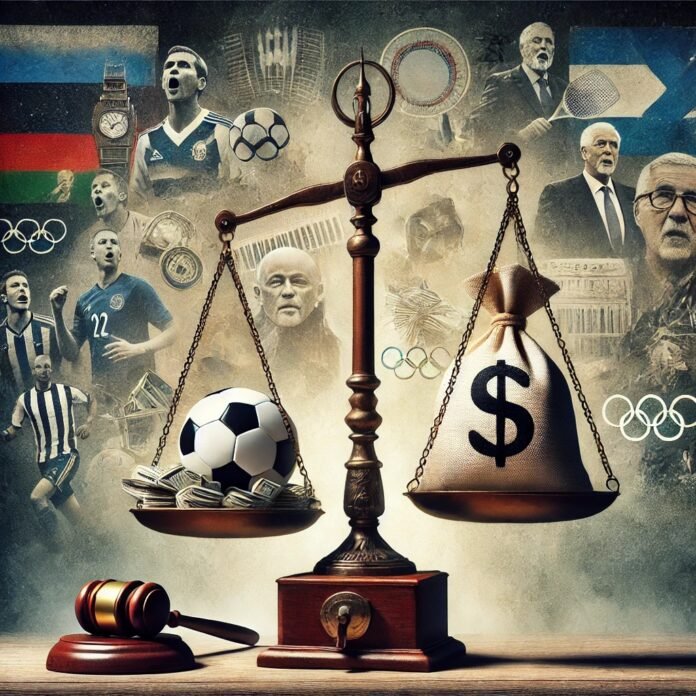[ad_1]
In September 2024, five tennis players were sanctioned for breaching the Tennis Anti-Corruption Program. The sanction was linked to a criminal case heard in 2023 involving a match-fixing syndicate in Belgium. Cases of corruption like this one have raised pertinent questions about the sanctity of competitions and international sports.
For corruption to be tamed there has to be robust governance frameworks aimed at promoting ethics and accountability in sports institutions.
Defining Governance in the Context of Sport Organizations
In sports organizations, governance encompasses the structure, ethical practices and accountability that are necessary for fairness and integrity. It outlines the nature of the interactions between the board of directors and the athletes, fans, and regulatory and sponsoring agencies. Effective governance comprises the presence of clearly defined board structures, independent oversight committees, and clear financial accounts. Where such controls are absent, immoral and corrupt acts such as bribery, match-fixing and betting on the results of contests are seemingly rampant.
A clear example is the FIFA corruption scandal of 2015, where several senior FIFA officials were charged with racketeering, wire fraud, and money laundering by the U.S. Department of Justice. These officials were accused of accepting bribes to influence World Cup bidding processes, including the 2018 World Cup in Russia and the 2022 World Cup in Qatar. The case, United States v. Webb, et al. (2015), led to multiple arrests and exposed widespread corruption within FIFA. Investigations by FIFA’s Ethics Committee resulted in eight-year bans for several officials, including former FIFA President Sepp Blatter and Michel Platini. The U.S. Department of Justice Press Release (May 27, 2015) detailed the charges and arrests, underscoring the need for stronger governance. This case demonstrated the importance of governance in preventing misconduct and restoring public trust.
The Scope of Corruption in International Sports
Corrupt activities such as bribery, match-fixing, doping and illegal betting undermine the fundamental essence of the concepts of competition which include fairness and integrity and these activities are likely to tarnish the reputation of the sports.
For instance, the Russian state-sponsored doping scandal back in the year 2019 was the reason for a four-year international competition ban, which was later reduced to two years by the Court of Arbitration for Sport (CAS) in 2020. It spelled out the utter disgrace attached to a lack of ethical foundation. Similarly, in the English Premier League, Ivan Toney was banned for 8 months in 2023 due to betting, which served as a warning to others.
To combat corruption, strong governance structures in the form of laws and policies within the sporting bodies need to be sought, otherwise, corruption will continue to destroy the integrity and the viability of sports across the world.
Governance Mechanisms in Sports Organizations to Prevent Corruption
The following governance mechanisms are crucial for curbing corruption:
- Board Composition:
A board of directors is crucial in every organization as it provides the ethical compass when making decisions and is responsible for strategic leadership All such roles assigned to board members must be specific, with a distinction made between executive and non-executive directors to avoid conflicts of interest, as such structure safeguards and provides checks and balances to all parts within an organization, and it does not allow corruption or any ethical misconduct behavior to take root.
- Independent Oversight Committees:
Independent oversight committees are essential to guarantee the organization’s core functions and activities fulfill ethical obligations and set policies and regulations. Among other things, these Committees are tasked with analyzing transactions, monitoring potential abuse of the conflict of interest, and internal transaction control. For instance, because of the FIFA corruption scandal, an independent ethics committee was set up to look into bribery and corruption allegations in the organization. They discipline the board members or the executives on the decisions that are put on the table and coordinate them with the organization’s vision and the public on the relevance of the decisions.
- Ethical Guidelines:
A code of conduct, as well as ethical standards documents in general serve to describe the reasonable expectations that the athletes, coaches, officials and administrators are to uphold. Such documents have also to place in elaborative detail the moral and fair conduct expected from the stakeholders. There should be repetitive and regular training and awareness programs to make people aware of the guidelines. These programs would help in informing athletes and other stakeholders about the threats posed by match-fixing, doping, and illegal gambling, as well as encourage them to report suspicious activities.
Various sports bodies worldwide, for instance, the International Olympic Committee (IOC), FIFA and other bodies are continuously monitored by other organizations like Transparency International (TI), Sports Integrity Global Alliance (SIGA), International Partnership Against Corruption in Sports (IPACS), Federation Internationale des Association de Footbealleurs Professionnels (FIFPRO), etc. And such bodies as the UN set international benchmarks and ensure that laws and codes of ethics issued by relevant competitions have local players’ compliance.
National compliance to International standards, and policies, for instance, the World Anti Doping Agency (WADA) provides the World Anti Doping Code which ensures that sports organizations maintain integrity and transparency. External policies help in bringing all domestic sporting organizations to the same level in terms of corruption control measures and this also assists in controlling the corrupt and unfair practices globally.
Conclusive remarks
Corruption in international sports can be avoided by the adoption of strong governance structures. Such mechanisms include independent boards and oversight committees as well as financial transparency and a code of ethics, these can be relied upon to promote a culture of integrity. Strong governance measures serve the purpose of reducing corruption in sports, gaining confidence among stakeholders, and safeguarding the sport for future generations.
[ad_2]
Source link

